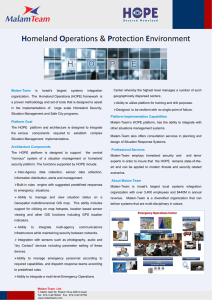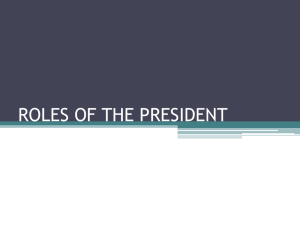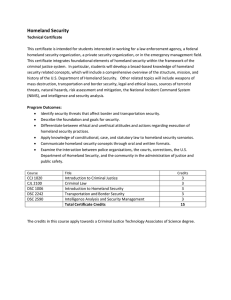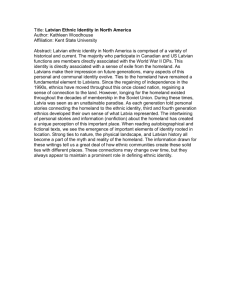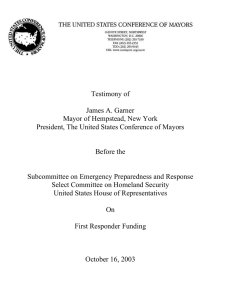Statement of Colonel Randall J. Larsen, USAF (Ret) October 16, 2003
advertisement
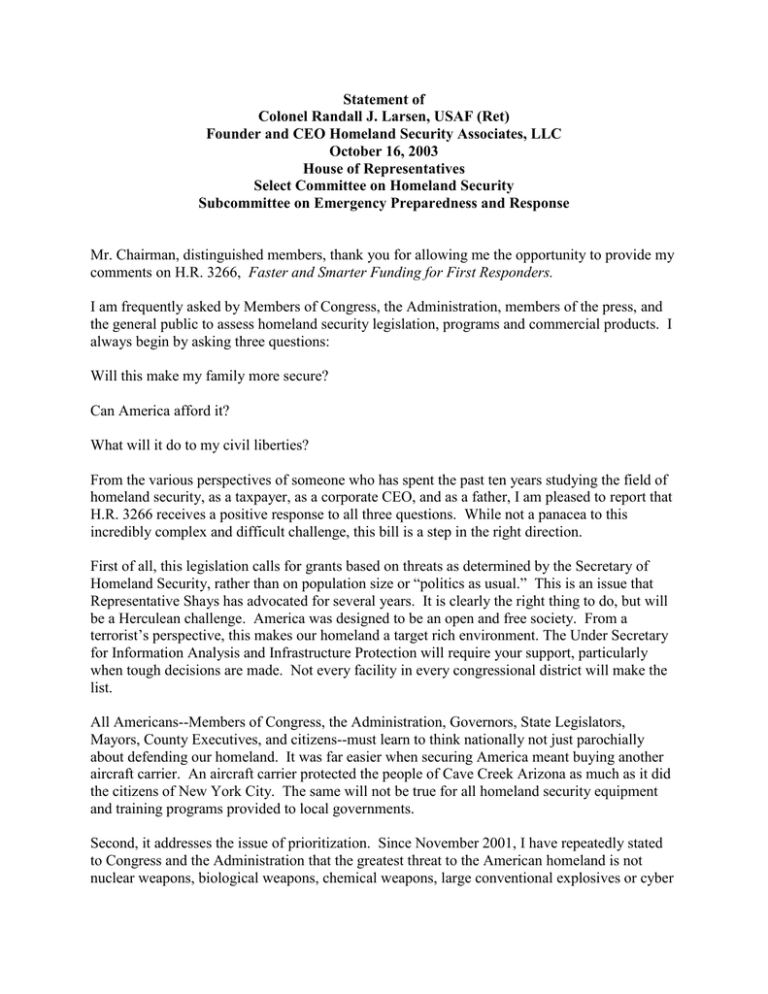
Statement of Colonel Randall J. Larsen, USAF (Ret) Founder and CEO Homeland Security Associates, LLC October 16, 2003 House of Representatives Select Committee on Homeland Security Subcommittee on Emergency Preparedness and Response Mr. Chairman, distinguished members, thank you for allowing me the opportunity to provide my comments on H.R. 3266, Faster and Smarter Funding for First Responders. I am frequently asked by Members of Congress, the Administration, members of the press, and the general public to assess homeland security legislation, programs and commercial products. I always begin by asking three questions: Will this make my family more secure? Can America afford it? What will it do to my civil liberties? From the various perspectives of someone who has spent the past ten years studying the field of homeland security, as a taxpayer, as a corporate CEO, and as a father, I am pleased to report that H.R. 3266 receives a positive response to all three questions. While not a panacea to this incredibly complex and difficult challenge, this bill is a step in the right direction. First of all, this legislation calls for grants based on threats as determined by the Secretary of Homeland Security, rather than on population size or “politics as usual.” This is an issue that Representative Shays has advocated for several years. It is clearly the right thing to do, but will be a Herculean challenge. America was designed to be an open and free society. From a terrorist’s perspective, this makes our homeland a target rich environment. The Under Secretary for Information Analysis and Infrastructure Protection will require your support, particularly when tough decisions are made. Not every facility in every congressional district will make the list. All Americans--Members of Congress, the Administration, Governors, State Legislators, Mayors, County Executives, and citizens--must learn to think nationally not just parochially about defending our homeland. It was far easier when securing America meant buying another aircraft carrier. An aircraft carrier protected the people of Cave Creek Arizona as much as it did the citizens of New York City. The same will not be true for all homeland security equipment and training programs provided to local governments. Second, it addresses the issue of prioritization. Since November 2001, I have repeatedly stated to Congress and the Administration that the greatest threat to the American homeland is not nuclear weapons, biological weapons, chemical weapons, large conventional explosives or cyber weapons. The greatest threat we will face in the years ahead is uncontrolled spending. America cannot afford to provide every first responder with every piece of equipment or every training program on their wish lists. America cannot afford a chemical detector in every government building or piece of critical infrastructure. America cannot guard every key facility in the manner that the nation’s capitol is currently protected. We must establish priorities and they must be based upon the three factors listed in this legislation: risk of significant loss of life, risk of large-scale denial of the means of human subsistence, and risk of massive disruption to one or more sectors of our economy. The most difficult task will be to define significant loss of life. During the Vietnam War, the government would report, “the casualties this week in the central highlands were light,” but we all knew that the families of those deceased soldiers had a different perspective on the term “light”. America lost nearly 3,000 innocent civilians to terrorism in 2001. On the other hand, America lost 5,000 citizens that year to food poisoning, 35,000 in automobile accidents and more than 90,000 to improper medical procedures. In the summer of 2001, a study reported that if all drivers and passengers of automobiles wore NASCAR quality helmets, fatalities would be reduced by up to 40 percent. In other words, if this Congress passed legislation requiring every occupant of every automobile in America to wear helmets, we could save more than 15,000 lives next year. Are 15,000 lives not significant? Why hasn’t Congress passed such legislation? How will the Secretary of Homeland Security define significant loss of life? You should provide him guidance. Third, this bill prohibits supplantation. From a homeland security and taxpayer perspective, I applaud this section of the bill. As a realist and an observer of how the system works, I guarantee you need more than one sentence in one bill to fix this problem. For a real eye opener on the seriousness of supplantation, I recommend you talk to Dr. Elin Gursky from the ANSER Institute for Homeland Security. Dr Gursky recently finished a study, funded by the Century Foundation, that examines this issue. The report will be released later this month. You will find it shocking to see how good ideas, intentions, and significant sums of money that come from this Congress get distorted, disrupted and diverted at the state level. Supplantation is an issue that deserves its own bill. It is something that must be corrected before we can see significant improvement in homeland security. Fourth, and somewhat related to issue three, is the bill’s requirement to push down “not less than 80 percent” of grant funds to local governments and first responders. This has been a problem I hear about frequently in my visits to those on the front lines of homeland security, such as police officers, fire fighters, and emergency medical personnel. In particular, I have heard this complaint from the public health community in California. I recognize that there is a significant budget crisis in that state, but money that is designated for front line troops should not be disproportionately skimmed by state agencies. HR 3266 provides penalties for failure to pass these funds down to local governments and first responders, but I wonder if there is sufficient manpower at the Department of Homeland Security to adequately monitor these grants. 2 Fifth, the flexibility provided to the Secretary of Homeland Security to transfer all or part of funds to a different project once a grant has been made fits the title of Faster and Smarter Funding. I applaud your insight and wisdom in providing such flexibility to the Secretary. Homeland security is a rapidly evolving field. I have taught graduate courses in Homeland Security since 1999, and find that I must make major revisions to my syllabus each semester. Flexibility is critical to success in homeland security, whether in the classroom or on the front lines. Finally, and in some respects most important, is funding for regional programs. America cannot afford to provide every fire house, every police department and every hospital emergency room with every piece of equipment and every training program on their wish lists. We must learn to leverage regional capability. If a major attack occurs in Washington DC, local leaders and first responders must be prepared to accept major assistance from surrounding communities and states. To do this effectively, we must conduct regional planning, exercises and training. Providing Federal funds for such activities is the best way, and perhaps the only way, to ensure that these regional players will not be exchanging business cards on the first day of crisis. Federal funding for multi-jurisdictional planning, exercises and training is critically important to making America more secure at price we can afford. I appreciate the opportunity to comment on HR 3266 and look forward to your questions. -end- 3

